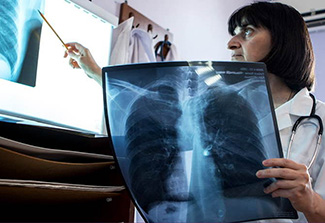Fogarty program central to groundbreaking TB trial
September / October 2022 | Volume 21 Number 5
 Photo courtesy of TB AllianceDr. Lali Mikiashvili was the lead principal investigator at the Tbilisi site for the ZeNix trail.
Photo courtesy of TB AllianceDr. Lali Mikiashvili was the lead principal investigator at the Tbilisi site for the ZeNix trail.
Study shows treatment for drug-resistant TB still effective with lower dosage and fewer side effects
A long-standing Fogarty-funded training partnership between Emory University and Georgian National Center for Tuberculosis and Lung Disease (NCTLD) played a critical role in the ZeNix trial testing a three-medication antibiotic regimen called 'BPaL' to treat drug-resistant tuberculosis (TB) in record time. Findings from this study, recently published in the
New England Journal of Medicine, are expected to impact treatment protocols around the globe.
The trial, which had sites at the NCTLD in Georgia, South Africa, Russia, and Moldova, shows that using half of the current recommended dose of linezolid, in conjunction with bedaquiline and pretomanid, had a success rate of over 90 percent in treating drug-resistant strains of tuberculosis in only six months versus the nine months to two years needed for standard treatments, and with significantly lower toxicity levels for patients.
Dr. Lali Mikiashvili, a former trainee under
Emory-Georgia TB Research Training Program, was the lead principal investigator (PI) at the site in Tbilisi, Georgia, and co-authored the recent publication. She says, "As someone who has worked on tuberculosis for so long, it is unbelievable to see results like this, so quickly, but the study proves that it works."
The high toxicity levels associated with the currently recommended dosage of 1200 milligrams of linezolid can often cause adverse events like nerve pain and bone marrow suppression in TB patients. Under the lower dosage of 600 milligrams of linezolid in combination with the other drugs, the rate of bone marrow suppression dropped to two percent from 22 percent, and the number of participants with nerve pain fell from 38 to 24 percent.
While Mikiashvili's career has centered around tuberculosis treatment and research in Georgia, she credits the growth in her research career to her mentors, former trainee and current MPI of the Emory-Georgia program, Dr. Nestani Tukvadze of the NCTLD, and Dr. Russell Kempker, Associate Director of the Emory-Georgia TB Program, from Emory University, whom she met during her time training under the Fogarty program in 2017.
"The knowledge I gained through the program allowed me to plan and conduct higher quality research. I also learned data analysis and manuscript writing, but the most valuable part of the program was my mentors who ensured I was learning and growing as a researcher."
The Emory-Georgia TB Research Training Program was established in 2004 in response to the Georgia's public health emergency due to high drug-resistant tuberculosis rates. It aims to enhance TB-related research capacity in the country through research training of Georgian investigators.
Dr. Henry Blumberg, Director of Clinical and Translational Research Training Programs at Emory and co-PI of the Fogarty-funded Emory-Georgia program, says, "It is amazing the impact of programs like this. For a modest investment, the return is enormous and transformative for many Fogarty trainees."
"I am forever grateful for the impact of this partnership," said Mikiashvili. "It is not only a financial investment but an intellectual one. Without the capacity built here over the last 18 years, this impactful study would have never happened in Georgia."
More Information
To view Adobe PDF files,
download current, free accessible plug-ins from Adobe's website.
Related Fogarty Programs
Related Global Health Research Topics